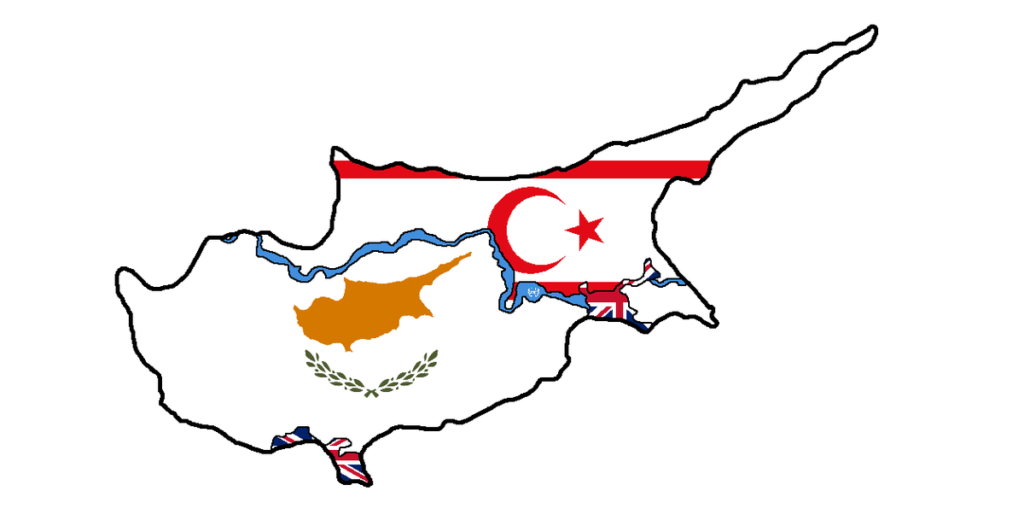Overview:
As Cyprus stands at a pivotal moment, shaped by new hydrocarbon discoveries and changing geopolitical alliances, its path forward oscillates between potential reunification and sustained division. In the wake of recent conflicts involving Turkish Cypriots and UN peacekeepers, Anas Dayeh writes and unpacks the complex dynamics at play, analysing historical contexts and the roles of regional and global entities in the current landscape. Dive into exploring Cypriot politics, where economic opportunities meet historical divides, steering the nation's path forward.
Cyprus stands at a geopolitical crossroads, its complex identity torn between Greek and Turkish influences that manifest in the Republic of Cyprus and the Turkish Republic of Northern Cyprus. Recent tensions have heightened this division, from near-naval standoffs between Turkey and Greece over newly discovered hydrocarbon reserves to incidents in the UN buffer zone that sparked clashes between Turkish Cypriot forces and UN peacekeepers. Adding to the complexity, the U.S. has extended its lifted defence trade restrictions on the Republic of Cyprus into 2024. As reunification emerges as a beacon of hope for some, it remains a point of contention for others. This article delves into these intricacies, combining historical context with perspectives from international security, diplomacy, and international relations to offer a nuanced understanding of Cyprus’s prospective future.
The Historical Backdrop
The history of Cyprus is woven from a tapestry of diverse influences, marking it as a crossroads where East meets West. Over the centuries, empires such as the Ottoman and the British have left indelible marks on its socio-political fabric. The Greek Cypriots and Turkish Cypriots, though cohabitants of the island for centuries, have navigated a relationship marred by tensions deeply rooted in historical narratives. This duality became more pronounced post-independence.

In 1960, Cyprus gained independence from British rule, emerging as a republic and attempting a delicate balance of power-sharing between these two communities. However, the equilibrium was short-lived. A coup by Greek forces in 1974 precipitated a Turkish invasion, irrevocably altering the island’s geopolitical landscape. The Turkish Cypriot community declared independence in 1983, but only Turkey recognises it as a separate state. The Republic of Cyprus, on the other hand, is recognised as the legitimate government of the entire island, with the exception of the Turkish Republic of Northern Cyprus (TRNC).
Delving deeper beyond these historical contours, Cyprus is uniquely positioned in global geopolitics. In the eastern Mediterranean, with its energy reserves and maritime routes, Cyprus emerges not just as a regional actor but as a player on the global stage, attracting the attention of nations far and wide, with its location making it a pivot in broader strategic calculations.
Moreover, the island has committed to substantial exploration activities in its Exclusive Economic Zone (EEZ), teaming up with global oil & gas companies. Last year, in 2022, the Cyprus Hydrocarbons Company discovered a new ‘Cronus’ field that alone holds an estimated 2.5 trillion cubic feet of natural gas. This cements Cyprus’s role as a potential pivot in the global energy landscape, beyond its immediate regional context.
Additionally, Cyprus’s maritime industry annually contributes over €1 billion to the economy, accounting for more than 5% of the world’s fleet. This underscores the island’s geostrategic importance, hinting at the immense economic potential of a reunified Cyprus. This was seen in a 2014 study by the Peace Research Institute Oslo (PRIO), which projected a nearly €5 billion GDP increase within the first five years following a peace agreement. The Institute conducted the study again in 2020, with the new projection being €17.4 billion within 20 years. This highlights the economic costs of division—fragmented markets, duplicated efforts, and lost opportunities for collaborative endeavours.
Recent Tensions and Developments
The Cyprus conflict, far from being a relic of the past, continues to evolve, deeply entangled in today’s geopolitics. The discovery of hydrocarbon reserves in the eastern Mediterranean has recently brought this enduring issue back into the limelight. This newfound wealth beneath the sea has reinvigorated old territorial disputes.
In 2021, Turkey and Greece found themselves on the brink of a naval standoff, primarily driven by Turkey’s ambitious gas exploration in waters claimed by Greece and Cyprus as their Exclusive Economic Zone (EEZ). This development is not an isolated incident but rather a subplot in the broader narrative of Turkey’s complex relationship with the European Union, providing a glimmer of diplomatic opportunity amid rising tensions.
Despite the allure of untapped energy, diplomatic avenues remain active, albeit fraught with challenges. The United Nations, a long-standing mediator in the Cyprus issue, has intensified its peacekeeping efforts. However, the history of failed talks, most notably the collapse of the 2017 Crans-Montana discussions, casts a long shadow over these initiatives, raising questions about the efficacy of international mediation.

In August 2023, a new crisis emerged, focused on a road construction project connecting the Turkish Cypriot village of Arsos with the multi-ethnic village of Pyla, located in the UN buffer zone. The project triggered a clash between Turkish Cypriot forces and UN peacekeepers, injuring three peacekeepers and damaging UN property. While Turkey framed the road as a humanitarian project, Greek Cypriots perceived it as a military manoeuvre. This incident was met with widespread international condemnation from the UN Security Council and key global players such as the EU, the US, and the UK. Whereas Turkish President Recep Tayyip Erdogan’s defiant stance, labelling the UN’s action as “unacceptable,” further complicated an already delicate geopolitical balance. Later on, the Security Council welcomed the halt in construction by the Turkish Cypriot side and urged both communities to avoid actions that could harm prospects for a settlement.
The United States’ role in this complex landscape is exemplified by its decision to continue lifting defence trade restrictions on the Republic of Cyprus for a second year, as announced by the US Department of State on 18 August. Initially enacted in 1987 to encourage peaceful negotiations, the embargo restricts the sale of arms that could be used in the conflict, thereby influencing the military balance on the island. The embargo was partially lifted in 2020 amid rising tensions between Turkey and Greece, signalling the intricate, multi-layered international interests at play.
To fully understand the intricacies of the Cyprus conflict, it’s helpful to view it as a multi-dimensional chess game. Each move—whether it’s Turkey’s military interventions or the complex interplay of historical grievances between Greek and Turkish Cypriots—represents a strategy rooted in larger theories of power (Morgenthau, 1948), identity (Wendt, 1992), and international engagement (Waltz, 1979; Doyle, 1997). And it’s not just a two-player game; global actors like the EU and the U.S. are also on the board, each making moves that influence the larger state of play.
The Path Forward: Reunification or Further Division?
Cyprus faces a dichotomy between potential reunification and continued division. The prospect of reunification is alluring for several reasons, chief among them being economic benefits. The island’s strategic location and natural resources, such as Mediterranean energy reserves, provide compelling practical incentives for unity. Reunification would also offer intangible rewards, including healing long-standing communal rifts and consolidating a shared Cypriot identity.
However, this pathway is fraught with challenges. Contentious topics like property rights, territorial adjustments, and security protocols loom large in any peace negotiation. Moreover, Greece and Turkey, the external powers most intimately involved, have strategic interests that complicate the reunification process. Their geopolitical agendas could either facilitate or obstruct progress, adding a layer of uncertainty.
The role of Turkish President Recep Tayyip Erdoğan is particularly complex. Known for his “tension-and-release” approach to foreign policy, Erdoğan has the potential to be both a disruptor and a peacemaker. His recent foreign policy shifts, such as Turkey’s approval of Sweden’s NATO membership, indicate a willingness to align with international norms, potentially signalling an openness to re-engage in UN-led negotiations for Cyprus.
Yet, there is also a growing sentiment that the existing division, while far from ideal, offers a form of stability. Over time, the Greek and Turkish Cypriot communities have diverged in their political ideologies and general outlooks, leading some to question the viability of reunification altogether.
The international arena is showing renewed interest in resolving the Cyprus issue. The UN Security Council is committed to a peaceful solution, with talks of appointing a Special Envoy for Cyprus. Additionally, upcoming diplomatic initiatives, such as the visit of the Greek Foreign Minister to Turkey, offer cautious optimism for eased tensions.
As Cyprus stands at a pivotal juncture, the potential for reunification offers both economic and strategic opportunities. The island’s untapped energy reserves present a compelling case for unity, with economic growth possibly serving as an incentive to overcome longstanding grievances. However, geopolitical manoeuvres, particularly those influenced by Turkish President Recep Tayyip Erdoğan, add layers of complexity to the situation. Ultimately, the future of Cyprus—whether reunified or divided—will be shaped by the collective will of its people, making their voice instrumental as international negotiations unfold.

